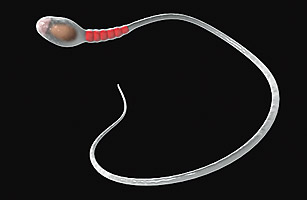
Hold your laughter. It's not the setup for a joke. Austrian researchers believe that a compound in human semen can have a dramatic impact on life span. Biochemists Frank Madeo and Tobias Eisenberg at the University of Graz led a team to test the effects of a substance known as spermidine. In yeast, spermidine was shown to increase life span by as much as a factor of four; in fruit flies, up to 30%; and in worms, up to 15%. When spermidine was applied to human immune cells, they too lived longer, with three times as many surviving after 12 days as in a comparison batch.
Spermidine works, the researchers show, by promoting the cellular process of autophagy — a kind of self-cleaning that, Eisenberg says, "removes cellular garbage such as clumped proteins or damaged or defective cellular organelles." Those things might otherwise harm the body.